
|
Epaper List
Submit
Subscibe
Publisher: Dean Shu-Chuan Yeh Publish Date:2022-11-30
|
 |
|
 |
|
|
Honor Roll 【College of Management Honors】Seven College of Management departments move up in Eduniversal’s Best Masters Degree Ranking 2022 【College of Management Honors】The College of Management, NSYSU is securely ranked internationally and continues to receive Eduniversal’s 4 Palmes of Excellence Award News Report 【IBMBA】 Guest Lecture - Turning the Trend into an Opportunity - Gogoro 【IBMBA】 Guest Lecture - What I wish I knew when I first started my career - Korn Ferry Peter Yuan 【IBMBA】Guest Lecture - Market Entry Strategy of Bosch and Siemens Home Appliances Group 【GHRM MBA】《111-1_GHRM503》Impact of the Implementation of a New Cleaning Procedure and the Effect of HRM on Infection Prevention in a Burn Unit of a Hospital 【GHRM MBA】《111-1_GHRM531》Thesis Writing Class - Journey from the Railways to Sustainable Transportation Research 【GHRM MBA】《111-1_GHRM531》Thesis Writing Class - Is Standard Employment Good for All?: Gendered Institutional Logic of Employment Patterns in South Korea |
Honor Roll【College of Management Honors】Seven College of Management departments move up in Eduniversal’s Best Masters Degree Ranking 2022 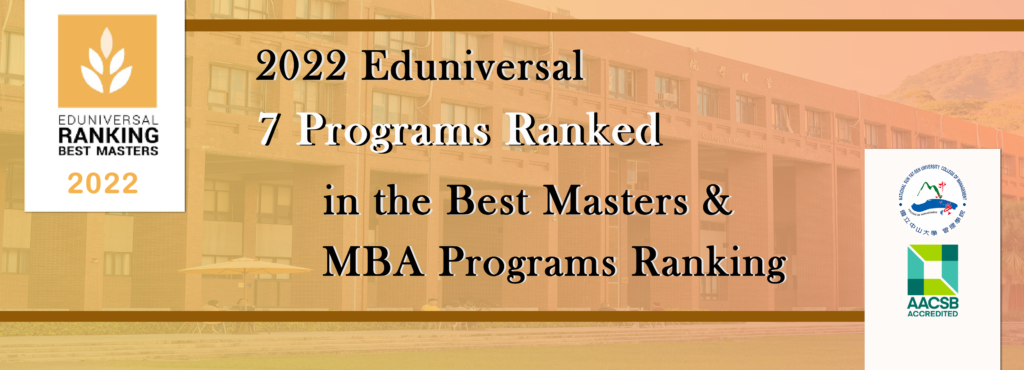 The College of Management at National Sun Yat-sen University was ranked third in Taiwan by the Eduniversal Business School Ranking of the world’s 1000 best business schools. Along with National Chengchi University (NCCU), the College received 4 Palmes of Excellence. In early November, Eduniversal announced the 2022 Best Masters & MBAs Ranking, and a total of seven departments from Sun Yat-sen University made the list. In the Eduniversal Best Masters list, seven departments in the College of Management have again made the list and almost all of them have moved up in the rankings. The College’s Master of Business Administration (Medical Management), the Institute of Human Resources Management, and the Institute of Marketing Communication have the honor of being the only departments in Taiwan in their respective categories to make the list. NSYSU’s EMBA program was ranked 28th in Far East Asia and 4th in Taiwan. The Department of Business Management’s MBA in Health Care Management program was ranked 90th in the world in the category of Health Management; the Institute of Human Resource Management was ranked 5th in Far East Asia in the category of Human Resource Management; the Institute of Marketing Communication was ranked 9th in Far East Asia in the Corporate Communication category; the Institute of Public Affairs Management was ranked 17th in Far East Asia and 2nd in Taiwan in the category of Public Administration/Management; the Department of Information Management was ranked 18th in Far East Asia and 6th in Taiwan for Information Systems Management, and the Department of Finance was ranked 26th in Far East Asia and 4th in Taiwan for Corporate Finance. Eduniversal’s Best Masters rankings are based on a rigorous selection process, covering 54 fields of study over 154 countries in nine regions. The departments were selected from a pool of more than 1,800 schools. Not all of the schools surveyed by Eduniversal had departments that made the list. This shows once again that National Sun Yat-sen University is an outstanding business school with a consistently strong international presence. Shu-chuan Jennifer Yeh, Dean of the College of Management, NSYSU, said that this year, the College has performed outstandingly in the Eduniversal rankings. Not only has it continued to be recognized as a member of the 4 Palmes League, but all departments have also continued to perform well. She added that in the future, the College will continue to improve and innovate, and she looks forward to even brighter results next year. Half of the department’s reputation score comes from employer evaluations of the department and the other half comes from the score of the business school to which it belongs. Salary of alumni’s first employment after graduation data are obtained from departmental data and verified by officials. Student satisfaction is based on a survey of students, which must be completed by at least 10% of the students in the department. Finally, the three scores are then summed for a total score of 1 to 15 points, and 1 to 4 stars are assigned based on the points. The Institute of Human Resource Management and the Institute of Marketing Communication of NSYSU’s College of Management were the only departments in Taiwan to receive the highest rating of four stars (12-15 points). Eduniversal Best Masters Ranking 2022 – National Sun Yat-sen University Masters ranked: https://www.best-masters.com/master-at-national-sun-yatsen-university--college-of-management.html 【College of Management Honors】The College of Management, NSYSU is securely ranked internationally and continues to receive Eduniversal’s 4 Palmes of Excellence Award  NSYSU was received the honor of being a 4 Palmes League business school. Eduniversal, a French-based organization specializing in the ranking of national institutions of higher education, held its 15th Annual World Convention in Cairo, Egypt, from October 30 to November 2, 2022. National Sun Yat-sen University’s College of Management received the honor of continuing to be a 4 Palmes League business school. Dean Shu-chuan Jennifer Yeh was present to receive the award. This honor represents that our school is ranked among the top 1000 business schools in the world and has a significant international influence. It was also ranked in the top three business schools in Taiwan. 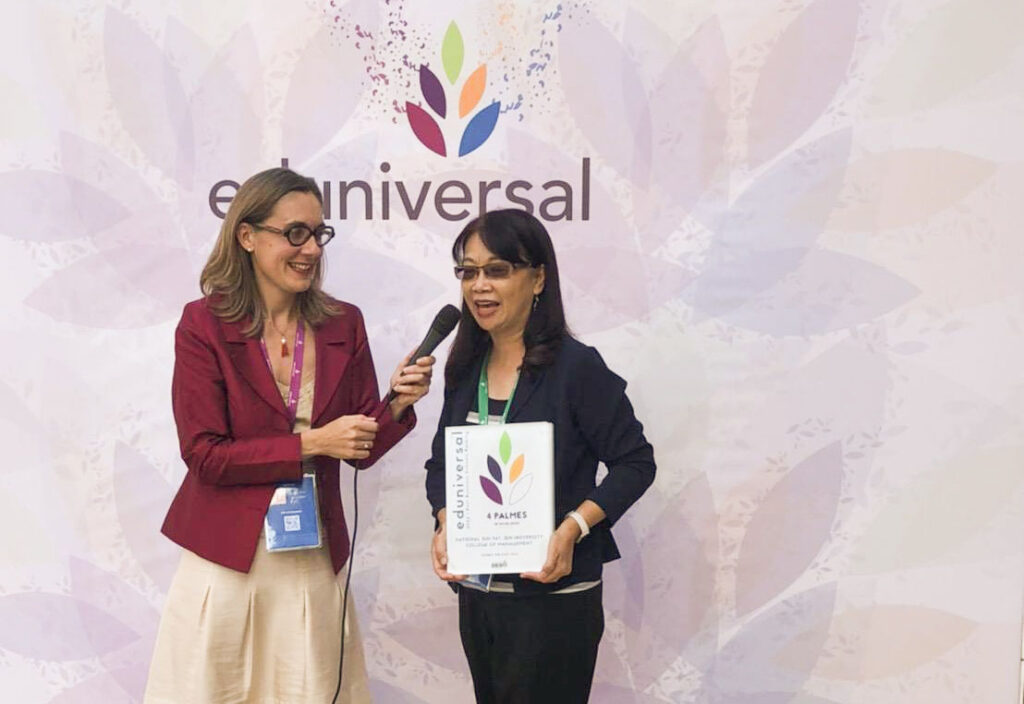 Due to the impact of the Covid-19 pandemic, this year was Eduniversal’s first in-person annual convention since 2019. The Dean of the College of Management, NSYSU, Shu-chuan Jennifer Yeh, said that only 200 business schools are selected for the 4 Palmes League among the 1000 best business schools in the world (see Note 1), and the continued award of the 4 Palmes is a great recognition of the internationalization of the College.  The Eduniversal’s 1000 Best Business Schools ranking has been conducted annually since 2007 and is designed to present a global map of higher education institutions. Unlike most business school rankings, the Eduniversal rating system features a cross-sectional comparison of schools in nine major regions (see Note 2). Instead of comparing business schools across regions, schools in the same country are ranked among the 1000 Best Business Schools in the world, highlighting the diversity of the higher education sector and the specificity of business schools in the nine regions.  In terms of the selection process, 1,000 business schools are first selected from 154 countries based on the number of students in the higher education system, national spending on education, and the number of academic research institutions in the country. The International Scientific Committee then ranks the business schools in the same region into the different Palmes of Excellence leagues (see Note 3), based on international indicators such as accreditation, international rankings, and membership in international academic organizations. Finally, the ranking within each Palmes category is determined by the Deans’ Vote, the mutual evaluation of the 1000 deans of the business schools. The College of Management, NSYSU has been promoting internationalization for many years. Many of our professors are from the United Kingdom, France, Sweden, Canada, Singapore, South Korea, Macau and other countries. We have partner schools all over the world, and we have signed dual degree programs and send many of our students abroad for exchange every year. In addition to the university’s resources, the College of Management also offers scholarships for international exchanges and waivers for English exam registration fees to encourage students to learn foreign languages and expand their international horizons abroad.  This year, Eduniversal selected seven schools in Taiwan: National Taiwan University (NTU) with 5 Palmes; National Sun Yat-sen University and National Chengchi University with 4 Palmes; National Taiwan University of Science and Technology, Fu Jen Catholic University, and Yang Ming Jiaotong University with 3 Palmes; and National Cheng Kung University with 2 Palmes. 2022 Eduniversal Business Schools Rankings – Taiwan: https://www.eduniversal-ranking.com/business-school-university-ranking-in-taiwan-region-china.html Note 1: |
News Report【IBMBA】 Guest Lecture - Turning the Trend into an Opportunity - Gogoro It is an honor to have Mr. Kirk James be our guest speaker in the seminar in business management course hosted by IBMBA. It is the first time we have Mr. Kirk here, sharing about how to turn the trend into an opportunity. Over 50 students in the classroom benefit from the idea with Gogoro’s real-life example.  To start the sharing, Mr. Kirk has a conversation with students by asking about their view of Gogoro, trends, and what they expected from the talk. After that, Mr. Kirk introduces what is trends. In order to build a concrete image, Mr. Kirk separated trends into different parts and combined them with Gogoro’s real-life example. Trends are not only trends to follow, from long-term strategy to rapid services, all can be operated by analyzing the trends.  The trends bring up what customers need and want. After explaining how to discover the trend, Mr. Kirk uses Gogoro's real-life example to share how to meet customers’ expectations: (1) Build a Gogoro technology platform which helps to change the trend into an opportunity. (2) Satisfy the customers and also have a 360 platform, product and service ecosystem. (3) Have business opportunities more than a scooter company can have.  Mr. Kirk introduces his mindset of understanding the customers. There are four trends that inform the user profiles: Be ahead, Be free, Be right, and Be well. The four trend leads customers to have different purchasing intention and how a company can approach them. Besides, a tool for catching opportunities is introduced. Gogoro elevated user experience and tailored design to catch new generation mobility for women. Mr. Kirk demonstrated how to get insight and discuss that, students are able to have a deep understanding of turning customers’ trends into opportunities.  Manufacturing and social responsibility are other concerns. The trends of the two aspects can also be studied and re-create the working process or even materials. To share with clearer image, Mr. Kirk shares Gogoro’s ideas and works. For example, paint-free polypropylenes and new manufacturing processes. Which can satisfy the tailored design trends from the customers’ aspect, also innovation trends on the manufacturing and eco-friendly aspect.  Students concert about eco and carbon production when manufacturing the Gogoro. Mr. Kirk is impressed and shares that it is something Gogoro always focus on. Gogoro hire a third-side institute to have a report on it, the report will be released in the near future.  During the Q and A session, students actively interact with Mr. Kirk. Students are asking different questions to have some insight and feedback from Mr. Kirk. Here are some questions asked by students:
 In the last session of the sharing, Mr. Kirk encourages students to ask more. Students actively interact and ask for more, from how to manage to what to manage. Here to thanks Mr. Kirk provides practical answer that students cannot learn from textbooks or case studies. From today’s lecture, students benefit from the practical way.  【IBMBA】 Guest Lecture - What I wish I knew when I first started my career - Korn Ferry Peter Yuan It is an honour to have Dr Peter Yuen be our guest speaker again in the seminar in business management course hosted by IBMBA. Different from last semester, Peter is going to introduce more about the start of his career. The topic ‘WHAT I WISH I KNEW WHEN I FIRST STARTED MY CAREER…’ sharing with over 50 students in the classroom.  To start the sharing, Peter introduces Korn Ferry and lets the students know about his view of the practical world. Afterwards, Peter shares about the early year of his career life. In his real-life experience, speaking up and communicating are important. Therefore, he encourages students to ask and talk during his sharing.  Dr Peter divided his whole career life into 3 parts, early years-first 10 years-past 10 years. From the first 10 years, he concludes that there are a few elements that are important for him to get what he has now. 
 During the sharing, students actively interact with Dr Peter. Students are asking different questions to have some advice or feedback from Peter, to make their future career life better. Here are some questions asked by students: 
Last but not the least, a few takeaways from Peter. 
 【IBMBA】Guest Lecture - Market Entry Strategy of Bosch and Siemens Home Appliances Group It is an honour to have Dr Florian Fuhl be our guest speaker in the seminar in business management course hosted by IBMBA. It is the first time we have Florian here, introducing the market entry strategy of Bosch and Siemens Home Appliances Group. Over 50 students in the classroom benefit from the practical industry strategy.  To start the sharing, Florian introduces Bosch and Siemens Home Appliances Group and lets the students know about his background. Florian also shares some interesting facts about the BSH group. Unlike other companies, females are the main characters in the BSH group. Most of the department heads are female and they are doing great in their position. Afterwards, Florian has an interaction section with the students by asking about their thinking about entering a market. There are some students who answer ‘culture difference’, Florian agrees it is an important element. Let an example of dishwashers, Taiwanese housewives are afraid to have a washer as they may label as ‘lazy wifes’. Florian thinks it shows the culturally different and shares how the BSH group deal with the culturally different.  To let the students know more about the practical strategy, Florian introduces BSH’s 4C model. During the sharing, we can understand that the model is similar to the theory that was taught in the lesson. However, there are serval changes to fit in BSH groups operation and brands’ strategy. Rather than using different models in different decisions, BSH is able to do almost every decision with the 4C model.  From classroom to reality, Florian has a guess section for the students to think in a different way. Using some simple questions, students are able to understand how a company will think with the same information. Also, he introduces some practical ways that the industry is using to deal with the same questions.  Dr Florian provides a different decision model which is useful for making most of the decisions. One of them is the GE-Mckinsey Matrix, it is a matrix not that familiar to the students. With Taiwan’s data as an example, Florian shows the full function of the matrix and the analysis tips on it. Since the matrix and real-life examples are fresh to the students, they are all interested and benefit from it.  During the sharing, students actively interact with Dr Florian. Students are asking different questions to have some advice or feedback from Florian, to know more about the practical business practice. Here are some questions asked by students:
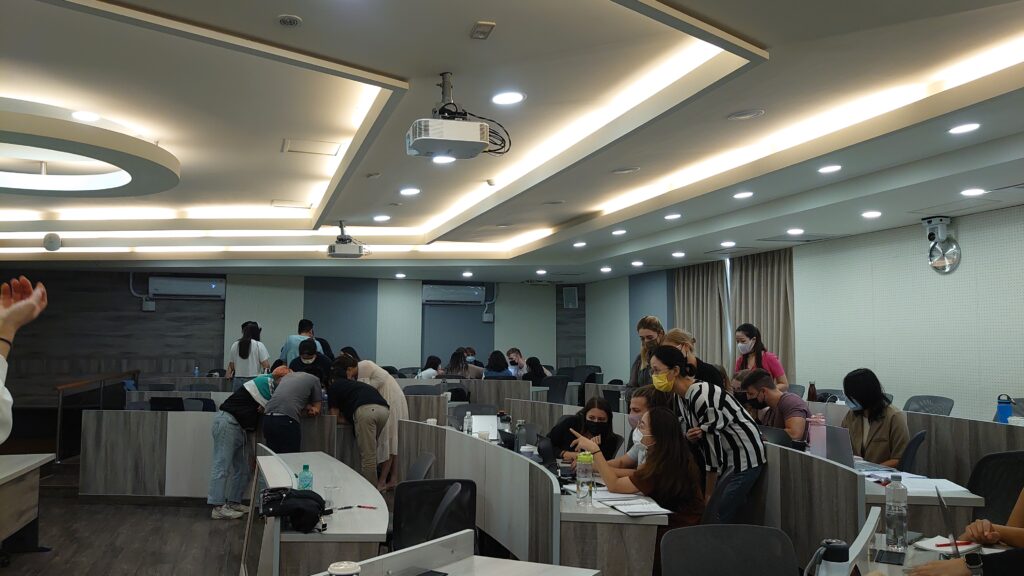 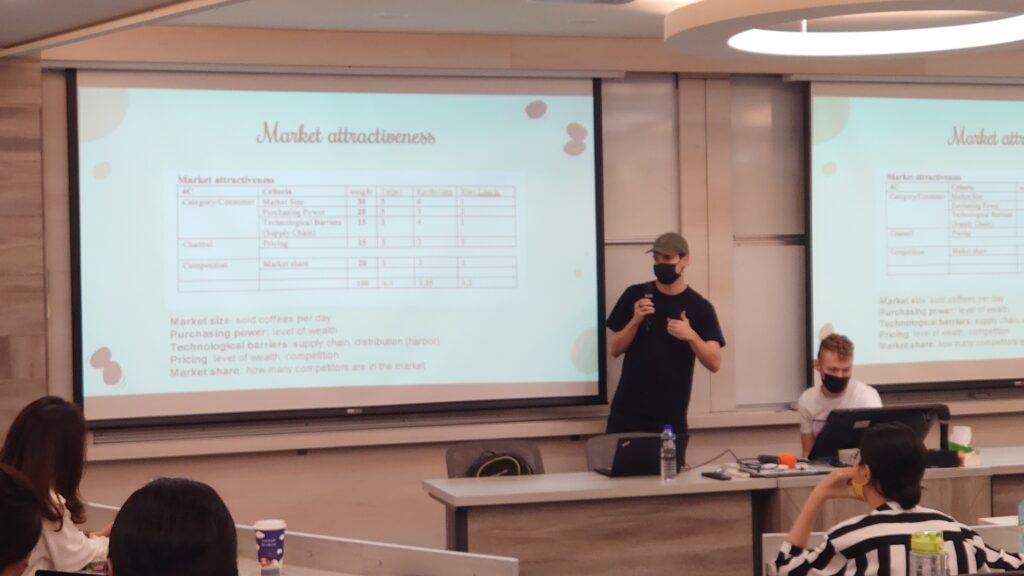 In a group discussion for students to brainstorm their idea, students are divided into groups and asked to have a presentation on marketing strategy in Taiwan. Every group try to use the method that Florian introduces to make a decision. Students choose different places in Taiwan from their analysis.  Dr Florian appreciate everyone’s work and gave positive comments on the presentation. He believes that students are now capable to use different analysis methods to make a market entry strategy. 【GHRM MBA】《111-1_GHRM503》Impact of the Implementation of a New Cleaning Procedure and the Effect of HRM on Infection Prevention in a Burn Unit of a Hospital On the 21st of October 2022, the Human Resource Management (HRM) class conducted by Professor François, under the Global Human Resource Management English MBA program, invited Dr. Alex Vanderstraeten from the Ghent University (Belgium), Faculty of Economics and Business Administration, as a guest speaker to talk about his research on “Impact of the Implementation of a New Cleaning Procedure and the Effect of HRM on Infection Prevention in a Burn Unit of a Hospital – Dead or Alive, The crucial Role of HRM in Saving Lives in a Hospital”. 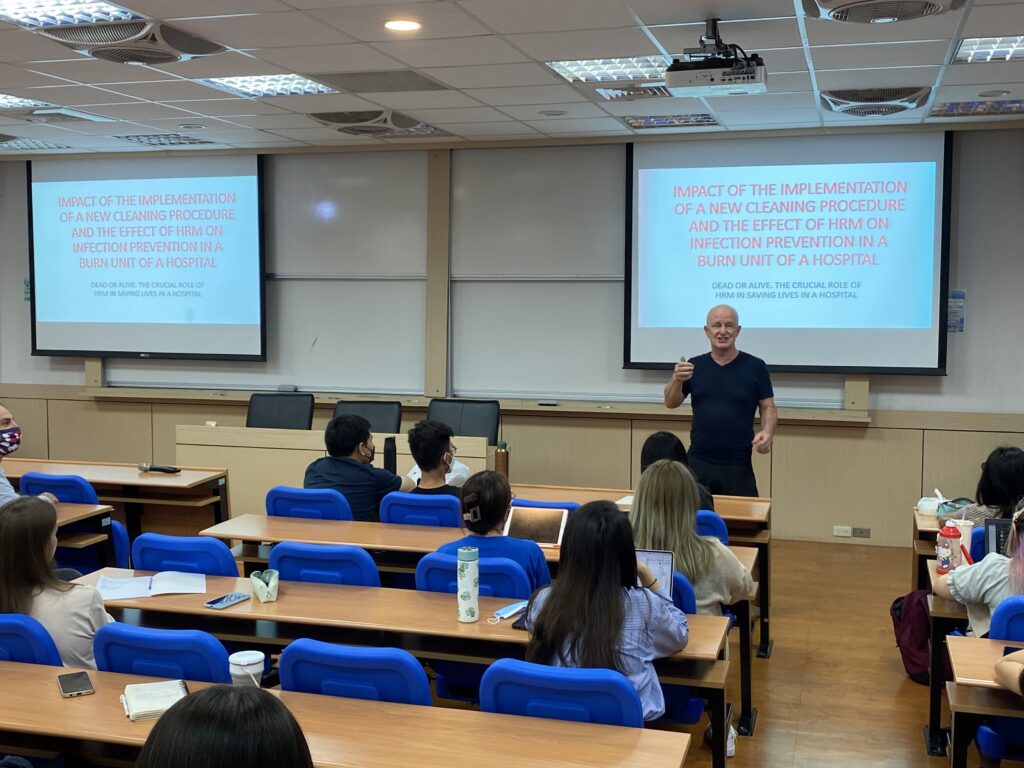 Warming up the class with a quick introduction of his background, Professor Alex currently holds a Ph.D. in Sociology and two master’s degrees in Philosophy and Sociology. As someone who has been in the education industry for decades, He has taught several courses in both bachelor’s programs and master’s programs, such as Sociology, Introduction to HRM, Strategic HRM, International HRM, and HRM Metrics. 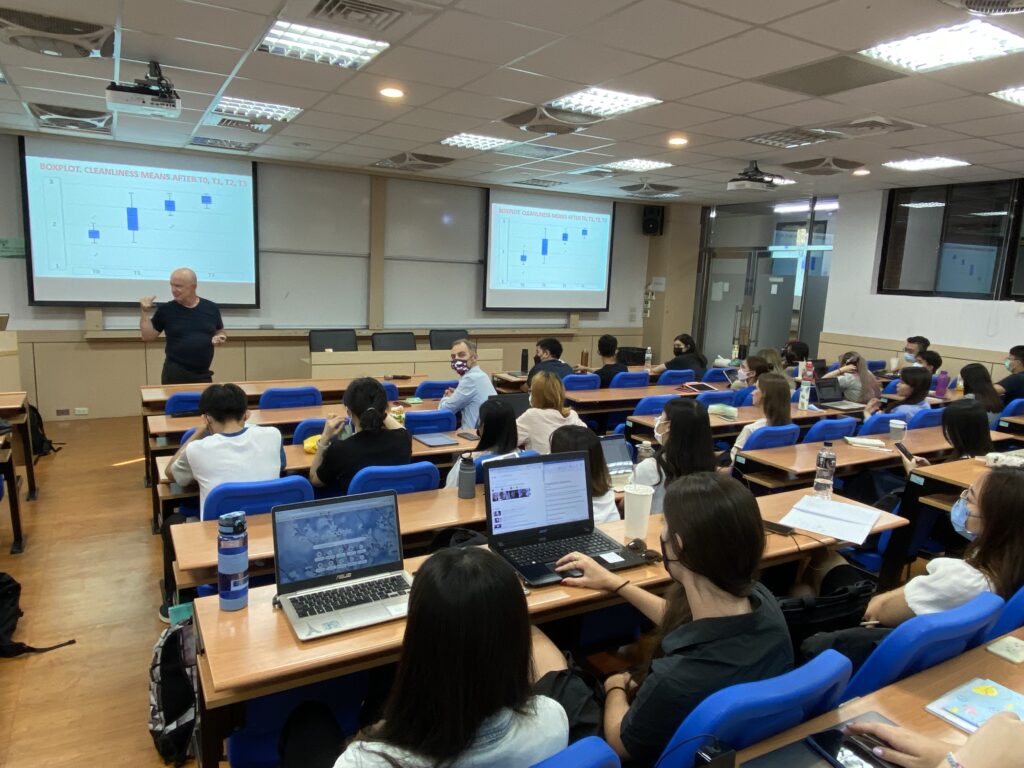 Professor Alex conducted his research in a hospital that focused on cleaning procedures performed by the doctor specialists, nurses, and cleaning staff. He adopted a similar concept to scientific management, with the process broken into four different stages of interventions, consisting of individual feedback, team-level feedback, etc., using UV marker and checking bacterial cultures as a means of measurement. 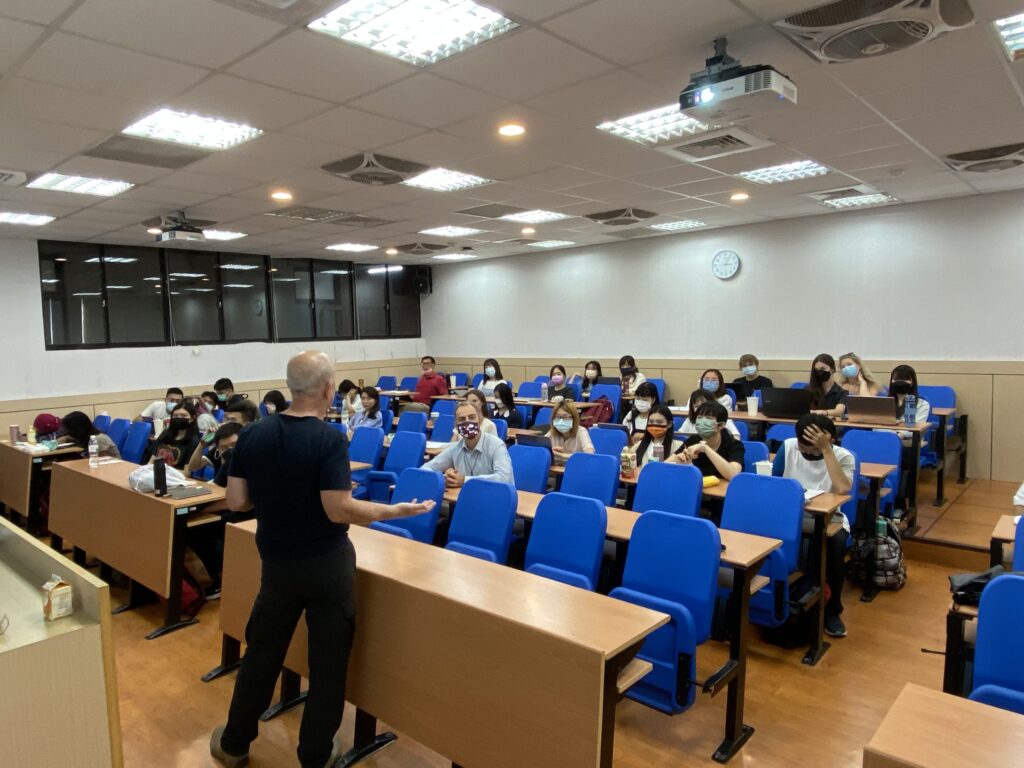 For students who aim to become HR professionals in the future, Professor Alex strongly encouraged them to have at least a basic understanding of statistics. As an HR professional, there will come a time when you have to look into a huge amount of data and perform a certain degree of data analytics to draw insights for management reporting. Through the use of analytics, you will be able to support your findings with something concrete, for example, the analysis of the effectiveness of training results on performance to your management, especially in a highly profit-driven work environment. 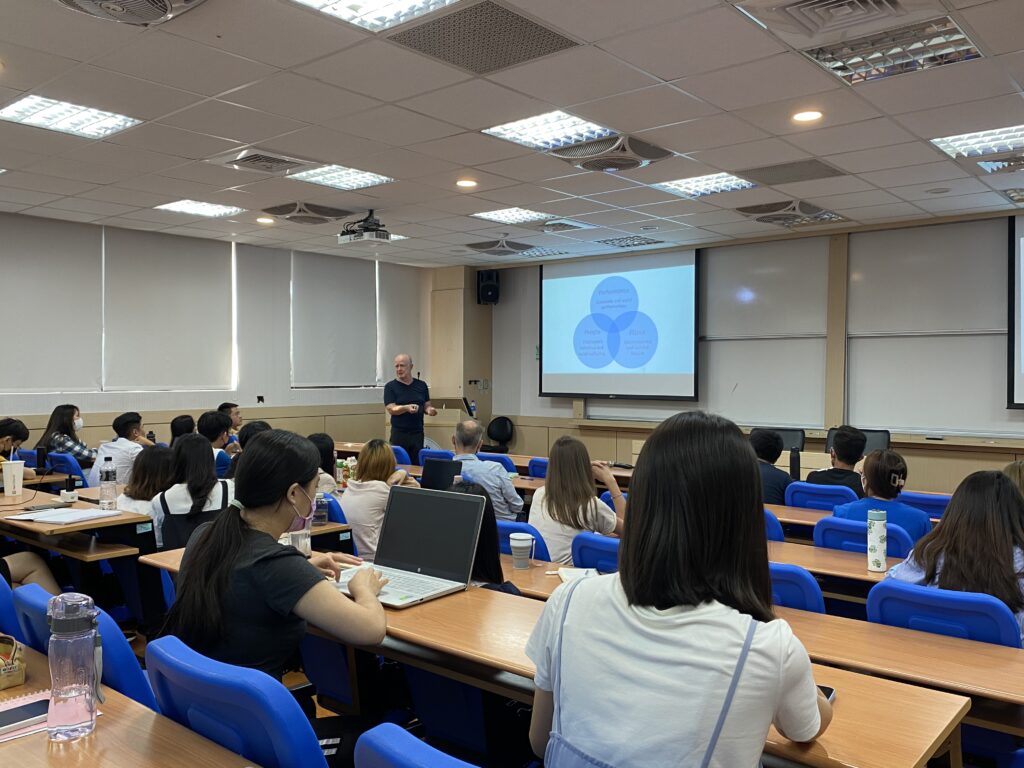 Raising an interesting question for the students, which is more important, money or health? Professor Alex shared that most of the current management research focused heavily on money. Through their research, it was found that money, or tangible rewards, has a diminishing return on employees. Money may be an important factor, but it starts to lose its effect on employees once they reach a certain level. This is when health, or issues like work-life balance, comes into the picture, especially in developing employee retention strategies. 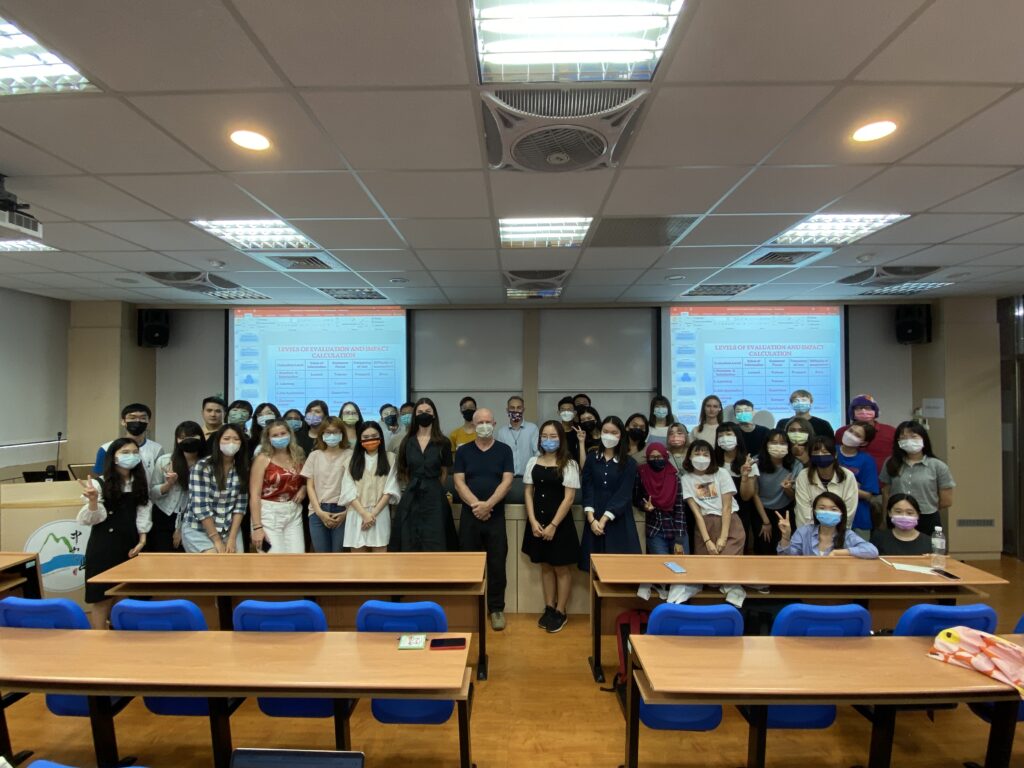 Concluding his sharing, Professor Alex mentioned that he hopes the students’ takeaway from his sharing is that HRM is more than profit-making. Throughout his years of research, many of his findings point towards communication between the management and the employees, being the key to developing a successful and sustainable HRM. Instead of focusing on just performance and returns from investments like employee training results, HR needs to go beyond KPIs and dig deeper to see if there are any underlying issues, such as communication breakdown that may lead to poor employee performance. 【GHRM MBA】《111-1_GHRM531》Thesis Writing Class - Journey from the Railways to Sustainable Transportation Research On the 23rd of September 2022, the Thesis Writing Class conducted by Professor François, under the Global Human Resource Management English MBA program, invited Professor Timo Eccarius from the Tunghai University, International College, as a guest speaker to talk about his journey of conducting his thesis research in the field of Railways and Sustainable Transportation. 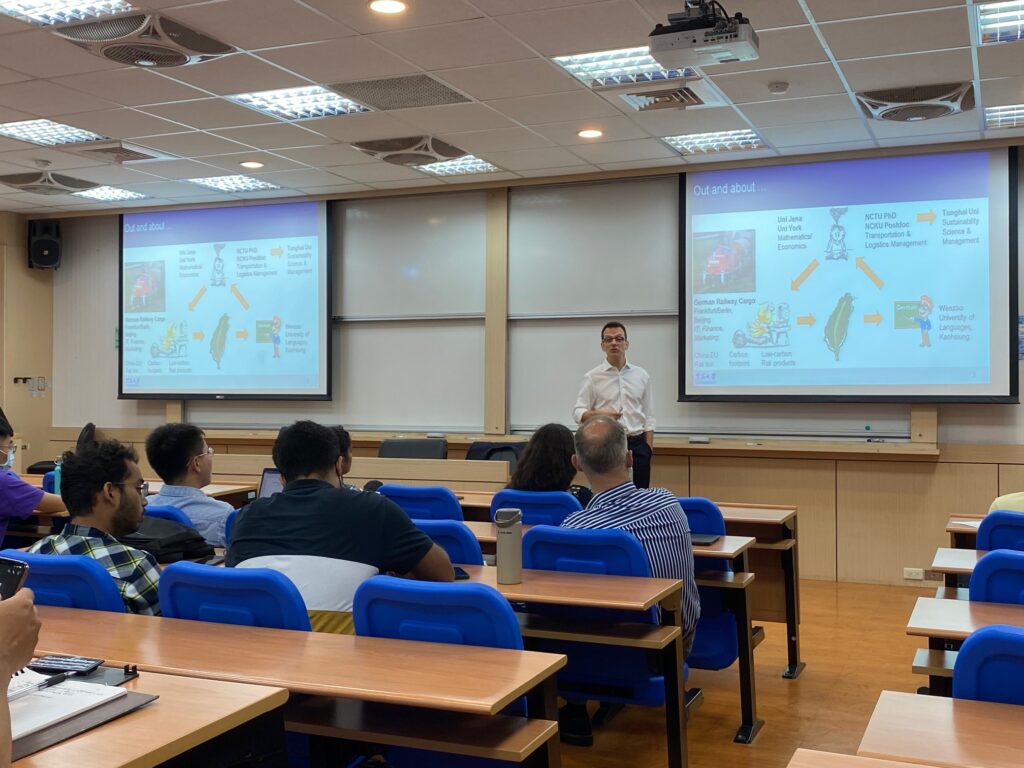 Starting his sharing with a quick introduction of his background. Having a Ph.D. in Transportation & Logistic Management and a bachelor’s degree in Mathematics/Economics, Professor Timo has previously worked in the railway industry in Germany for 13 years before coming to Taiwan. During his stint in Germany, he worked on a couple of projects such as the China-EU rail link which aims at reducing Carbon footprint and low-carbon rail products. Moving on, he painted a picture of the railway industry and the carbon emission from the various mode of transportation to the students. Through the Deutsche Bahn 2018 Integrated Report, it was shown that railway transportation produces the lowest carbon footprint in comparison to other transport like airplanes, cargo, etc. With the increase in awareness of global warming, the railway industry faces strong pressure from the public to push toward creating sustainable transportation with the ultimate goal of being carbon-free. 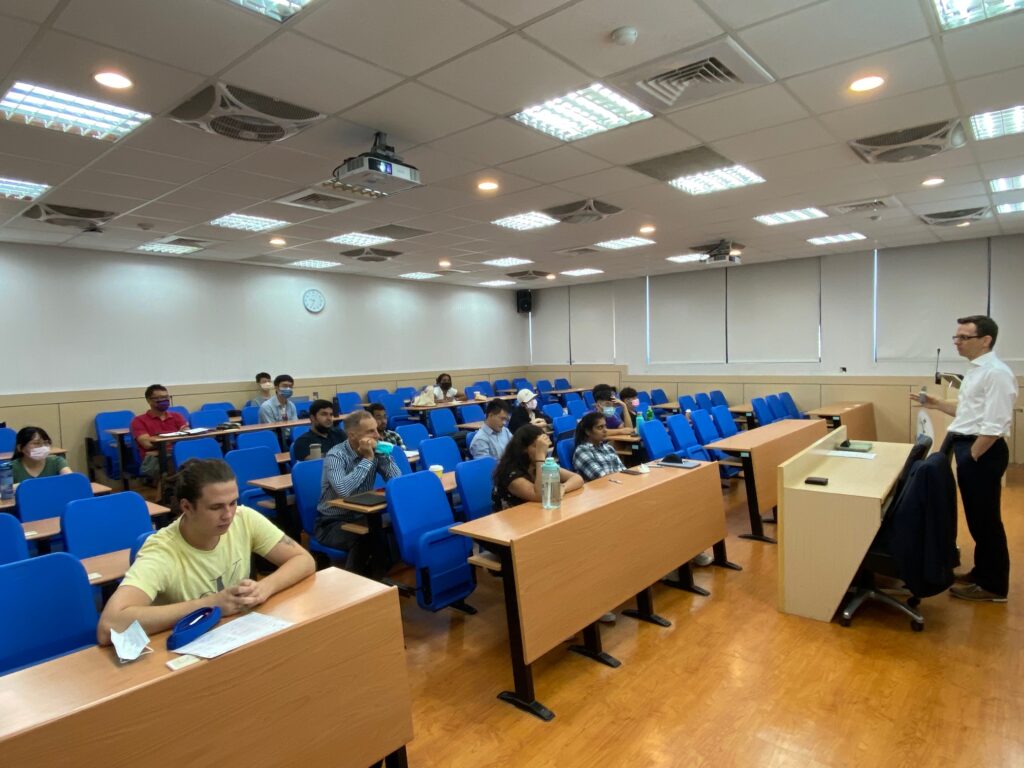 Professor Timo continued his sharing by giving some tips to the students on how to look out for possible topics for their study/research. Quoting him, “Follow your passion, fight for your idea, and trust your advisor”. One of the most important tips he mentioned was to choose a topic that aligns with your passion. Using his journey of how he did his Ph.D. thesis as an example, he recalled the numerous discussions he had with his thesis advisor. “You should expect that during the discussions, there are bound to be conflicting ideas from both parties. There may even be times when you have to stand your ground and defend your thesis research”. As such, having a thesis topic that you are passionate about would help in such challenging times. 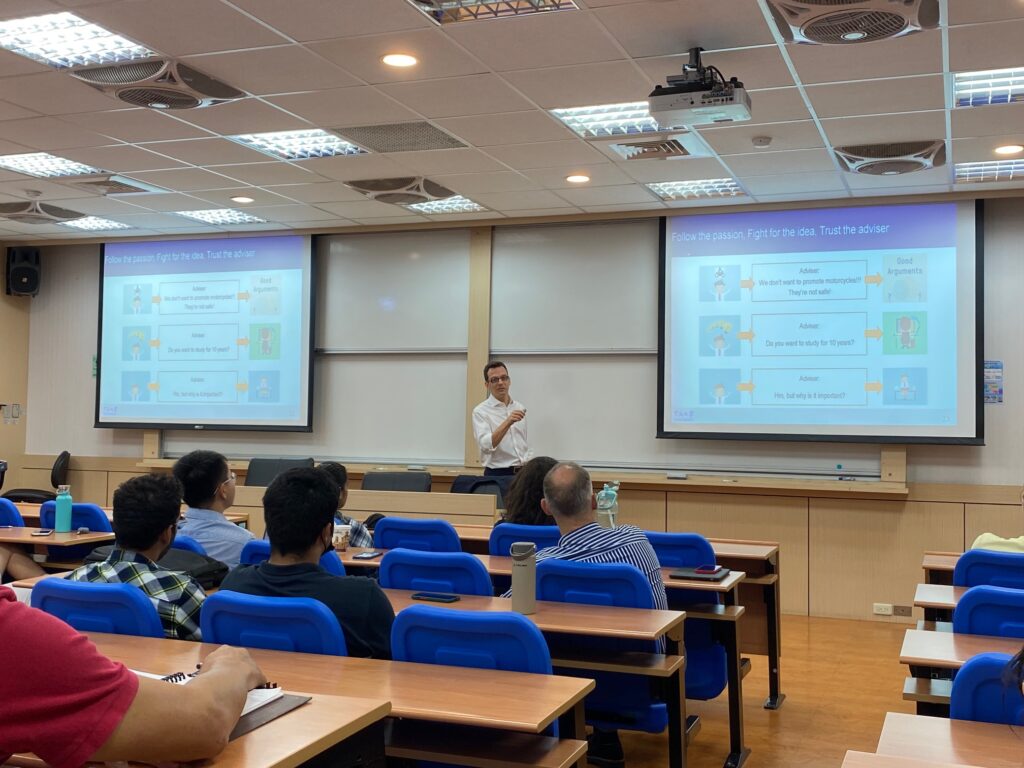 Another tip that he mentioned was the formulation of research questions is often an iterative process. As you go along with your thesis research, you should start to narrow down the area that you would like to focus on. One reason for this is the limitation of access to data. Having a broad or general research topic can be challenging as you may not have access to the resources needed to help build the core of your research. Even if you pool data from different sources can be problematic as the results may not be compatible or comparable with each other. With that in mind, having keywords to help specify the key areas of your research would help to ease the load when you conduct your study. 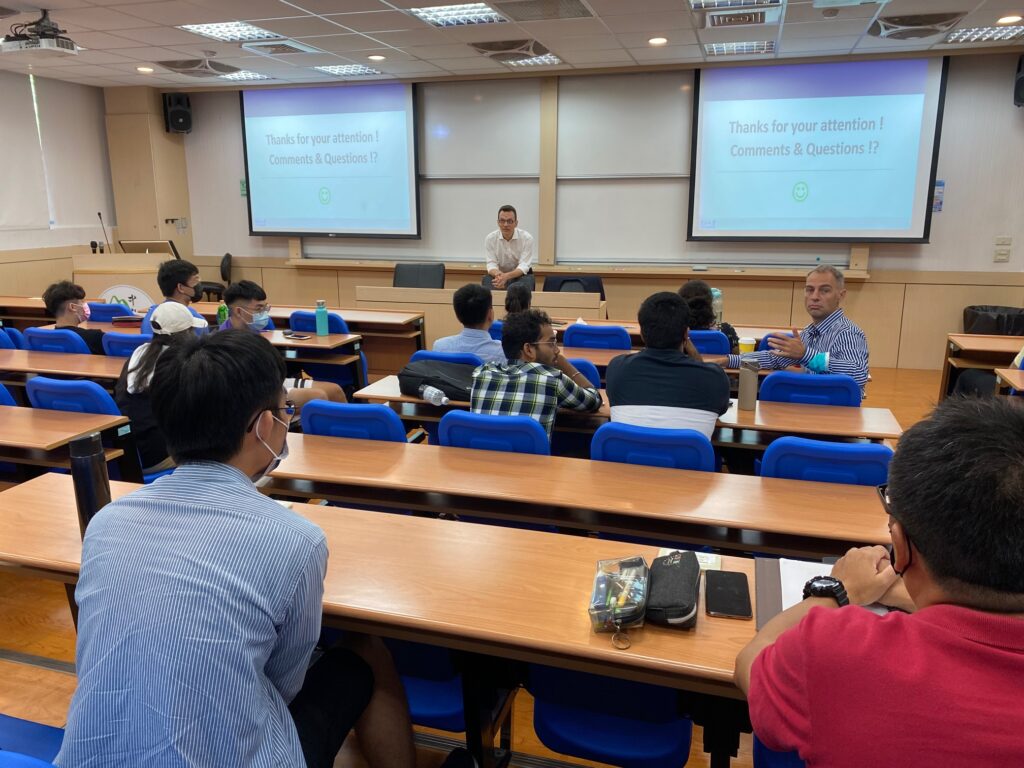 Addressing some of the questions raised by the students, one particular question hit close to the heart of Professor Timo, and perhaps, many other international students at NSYSU. “As a foreigner conducting research in Taiwan, what were some of the challenges he faced?”. When he was conducting his research in Taiwan, language proves to be one of the biggest hurdles. Having to deal with software and creating questionnaires/surveys in the Chinese language can be quite difficult for foreigners who are not proficient in the language itself. Thankfully, with the advancement of technology, the use of programs such as “Google Translate” can help to ease the pain. It is also good to seek help from your peers or advisor if you encounter any issues. 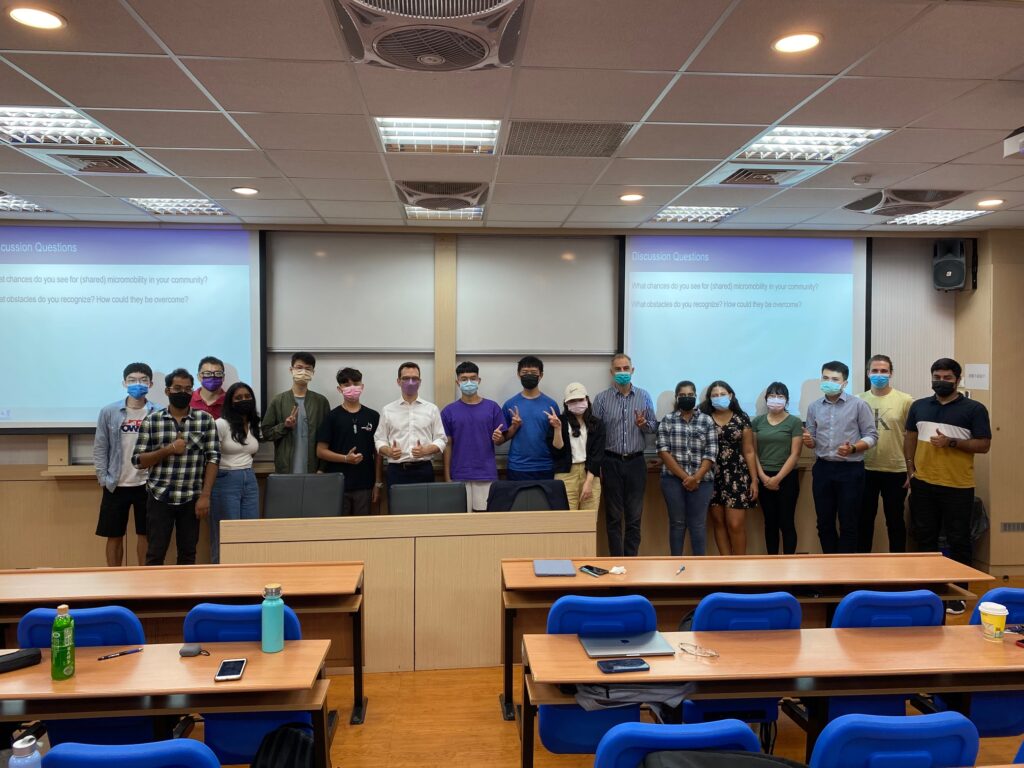 【GHRM MBA】《111-1_GHRM531》Thesis Writing Class - Is Standard Employment Good for All?: Gendered Institutional Logic of Employment Patterns in South Korea On the 14th of October 2022, the Thesis Writing Class conducted by Professor François, under the Global Human Resource Management English MBA program, invited Dr. Francis Yoon from the University of Duisburg-Essen (UDE), Germany, as a guest speaker to talk about his journey of conducting his thesis research that was awarded the 2022 David Marsden Best Paper Prize on “Is Standard Employment Good for All?: Gendered Institutional Logic of Employment Patterns in South Korea”. 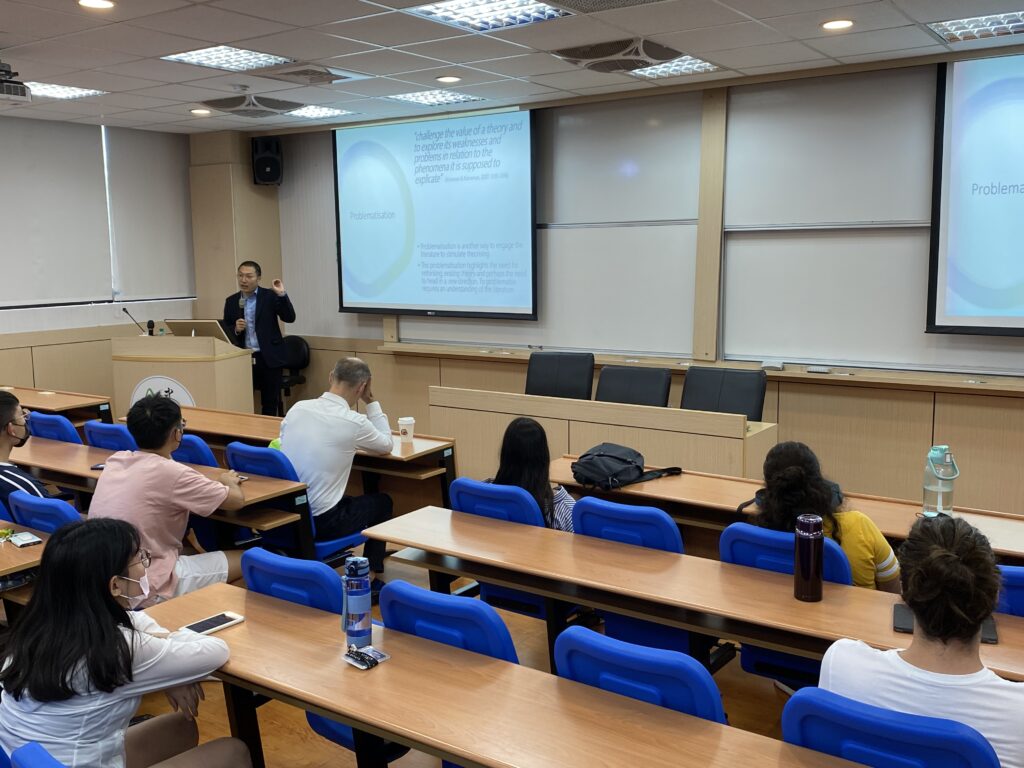 Warming up the class with a quick introduction of his background, Professor Francis currently holds a Ph.D. in Management and a Philosophy Master’s degree in Modern Society and Global Transformations. He previously worked in the finance and accounting industry for several years prior to his pursuit of his master’s degree and Ph.D. Currently, at UDE, he has been teaching master’s classes related to economics and management. 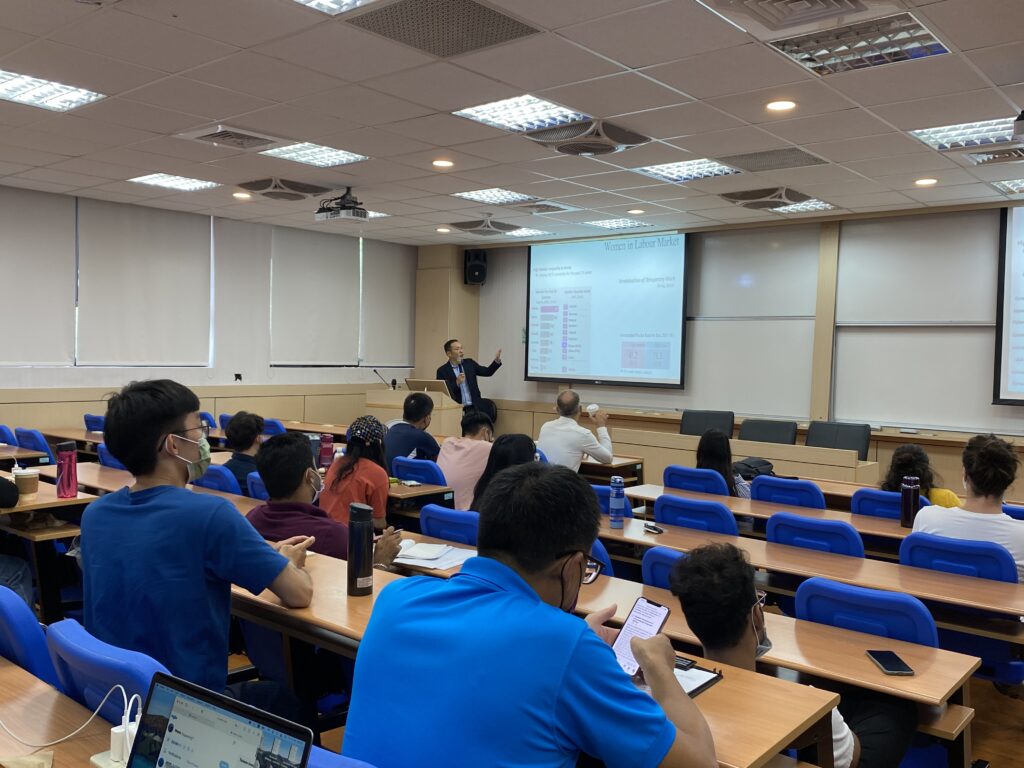 Directing the class to the theme of the sharing, he painted a clear picture of some of the keywords that would be essential in understanding the basis of his research, such as explaining what standard employment contract means, the background of the labor situation in South Korea, the female education landscape in South Korea, etc. Interestingly, although South Korea has the highest college enrolment rate among the OECD countries, even for the female, however, based on his findings, this did not translate to a higher salary for the female, which contradicts the Human Capital Theory where the higher the education level, the higher the chance of getting a better paying job. 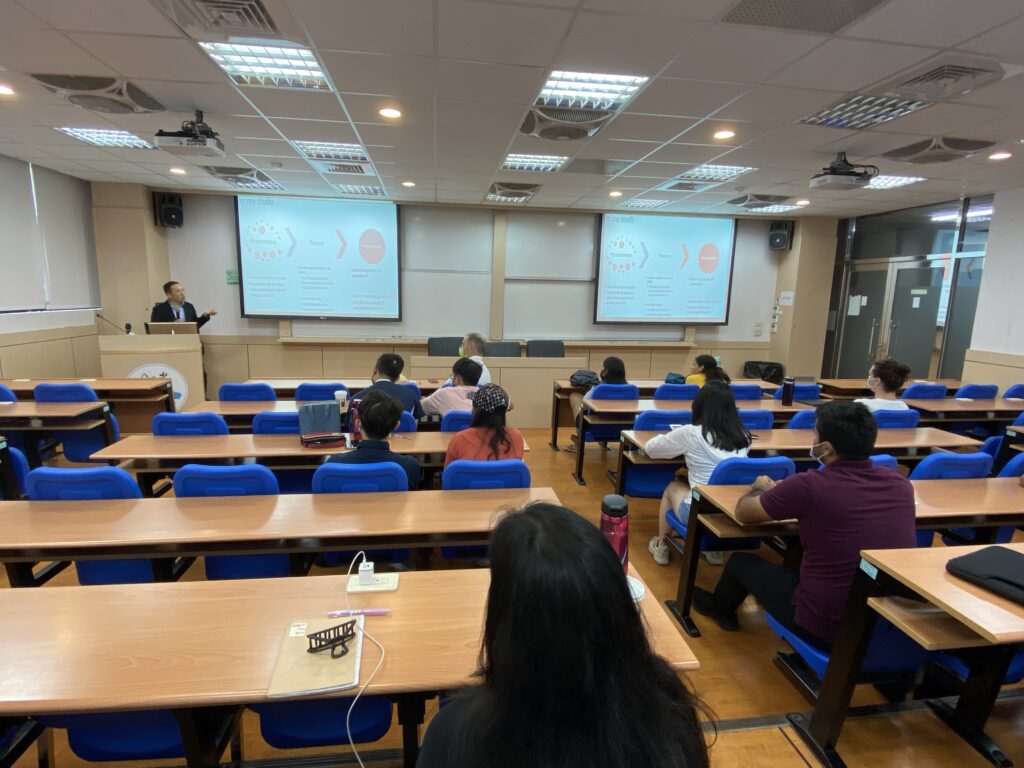 Discovering this issue during one of his field research projects in a shampoo factory in South Korea for another study, he decided to investigate further and look into the causality of this phenomenon. In the shampoo factory, 99% of the factory employees were female employees who were performing low-skilled jobs and were paid a minimum wage. Just like many other factories in South Korea, many of the low-skilled jobs were taken up by females. When cross-referencing to the Feminist theory, this phenomenon can seem to be explained on an institutional level where historically, South Korea has a culture of a male-breadwinner system which was deeply rooted back in the industrial era. Furthermore, when the South Korean economy was receiving heavy capital investment from Japanese companies back in 1965 for the textile industry, the workforce was mainly made up of women who did not receive high education. Even after the company grew in size, the institution within the companies did not change, contributing to the phenomenon. Professor Francis’s research eventually discovered that Human Capital Theory may not apply to all genders, especially to women, due to the country’s history/culture or institutional discrimination that was unintentionally set in place. 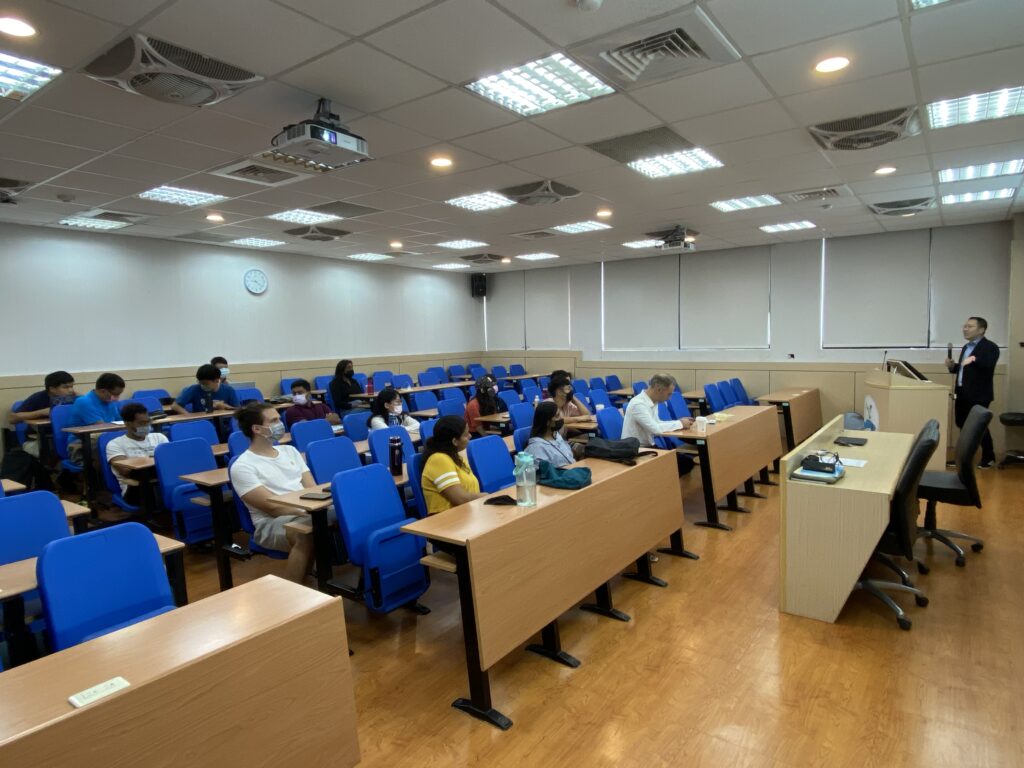 Concluding his sharing with some tips on his own on how to prepare for their thesis, students may first consider looking up some phenomena that they came upon and are interested in before having a deeper look into the issue. Once you have identified your topic, you should then proceed to look into the related theories that may help to address or explain the phenomenon. When deciding on your topic, it is always good to be more specific than to have a general theme as it would help to narrow down areas that you should look into. 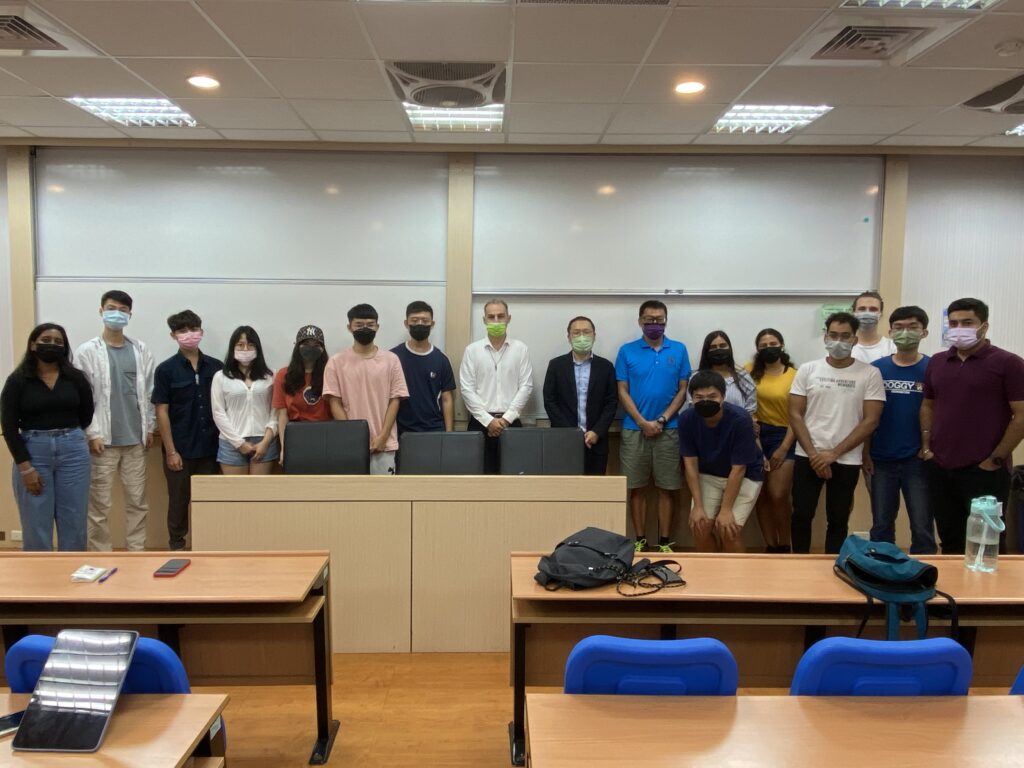 |
 |
|
| ©2016 College of Management National Sun Yat-sen University. All rights reserved. | CCCM |